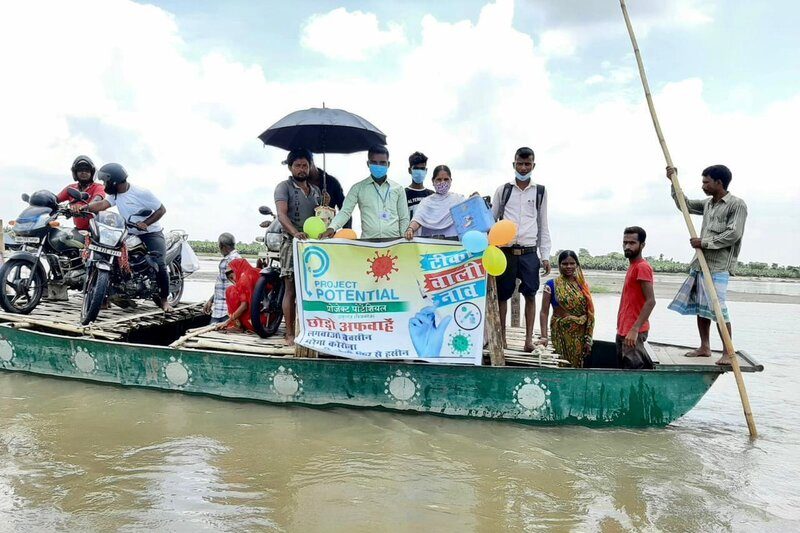Prior to joining the MPP in Global Affairs at Jackson, I co-founded a community based organization in Bihar, India called Project Potential. Our vision is to cultivate the grassroots leadership talent required to end poverty in India’s 100 poorest districts sustainably and inclusively. We do this by equipping local youth leaders with the knowledge, skills, attitudes, and networks they require to solve rural India’s challenges.
When the second wave of COVID-19 began in India in March 2021, we at Project Potential knew that, as a community based organization, we had to respond. While immediate care for the sick was required, we realized that the only way to protect people from severe illness and death would be vaccination.
In order to increase vaccination, we had to understand the situation on ground. We quickly realized that while there was a national supply shortage, in our area, the main constraint was lack of demand for the existing supply. So we had to understand why demand for vaccinations was low.
To do so, we talked to people in the community to understand their perspective. Consider Bittu (name changed). Bittu is a daily wage worker at a brick factory; his work is arduous and he is the main breadwinner for a family of 5. He earns 300 rupees per day (roughly $4.) He broadly knows that vaccination is happening, but he does not know when, where, or how to get vaccinated. Based on previous experiences with the public health system, he knows that things generally do not function very well; employee absenteeism, undersupply of materials, and a lack of attentiveness are all conditions which he has observed.
Therefore, if he tries to go for vaccination, he knows that he may miss work and then not get vaccinated, in which case he will miss out on earning for that day for himself and his family. Add on top of that the fact that while buying groceries at a local kirana (grocery) store a few days back, he heard a story about a person from a few villages over who took the vaccine and died. On the other hand, no one he knows has been vaccinated. Is it any wonder why he has not been vaccinated and is not inclined to get vaccinated?
Once we understand the situation of various people and groups in the community, we can then address each issue in a systematic way. Toward that end, we have done the following:
- An army of 150 local volunteers, each assigned to their village, who explain the why, what, where, and how of vaccination: these volunteers work in their own villages, where they are known and trusted. They listen to concerns and also share information. They visit multiple times to provide additional support and follow up where required.
- Loudspeaker theater performances with original content performed by local theater artists that provide information on vaccination: The van parks in the center of a village, and then the musicians and actors/actresses perform the content. It is entertaining and filled with information on the benefits of vaccination.
- Aligning vaccine supply with demand by coordinating with the Primary Health Centre (PHC): Once people are ready to get vaccinated, we coordinate with the PHC to ensure vaccines are available so that people’s time is not wasted.
- ‘Tika’ (Vaccination) Express vans and boats to bring nurses to remote villages to vaccinate villagers: While all 23 panchayats we are working in have a vaccination center, the distance between a specific hamlet and the vaccination center can be as far as 7 KM and may also be bisected by rivers and other features that make it difficult to reach. For that reason, we have hired ‘Tika Express’ vans and boats to bring nurses to these locations to support vaccination.
- In partnership with Adharshila Trust, telemedical service for those who are sick or experiencing symptoms: Given the concern that community members feel for if and when they do feel symptoms, we have partnered with Adharshila Trust to connect them to their team of doctors for a telemedical consultation.
- Rations for the most economically insecure who are forced to miss work to get vaccinated: Rural Kishanganj District, Bihar has a substantial percentage of daily wage workers who cannot afford to miss work for even one day and/or cannot afford to be less productive at work; tea garden workers, for example, are paid by the number of KGs of tea leaves that they pick during the day. We are providing these families with ration packets so that getting vaccinated does not require going hungry.
To date, through these processes, we have facilitated vaccinations for 80,000-plus people in Kishanganj District, Bihar.
This process has reinforced our long standing belief of what community based organizations exist to do: talk to people; trust what they say about their own situation and challenges; and then design with them to create workable solutions. Whenever we do so, good outcomes follow.
